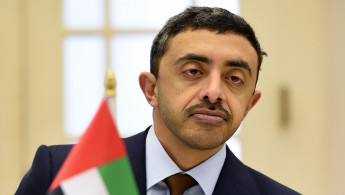Follow us on Facebook, Twitter and Instagram to stay connected
UAE looks to boost international standing with UN Security Council seat
The UAE is seeking a seat on the UN Security Council.
2 min read
The UAE is seeking a place on the UN Security Council [Getty]
The UAE launched its bid for a seat on the United Nations Security Council under the slogan "Stronger United", as Abu Dhabi seeks to bolster its international standing following its recent normalisation deal with Israel.
Minister of Foreign Affairs Abdullah bin Zayed announced on Tuesday the UAE's candidacy for a non-permanent seat on the Security Council between 2022 and 2023 during a speech to the UN.
"My country will follow the same steps and principles upon which it was founded to maintain international peace and security in cooperation with the members of the Council," he told the UN General Assembly.
"We recognise the significant responsibility associated with membership on the Security Council and the extensive challenges the Council faces, and we affirm that the UAE will work towards solving the important issues confronting states with resolve and determination."
The foreign minister used the UAE's recent pact with Israel as a factor in the Gulf state's bid to become a non-permanent member of the Security Council, repeating since dismissed claims about Abu Dhabi's motives for normalisation.
"With the signing of a historic peace accord with Israel, supported by American efforts, my country was able to freeze the annexation decision and open broad prospects to achieve a comprehensive peace," the foreign minister said in a statement to the UN General Assembly, according to The National.
He also used the speech to attack regional rival Turkey for its military support for the UN-recognised Libyan government in Tripoli, which a UAE-backed militia leader, Khalifa Haftar, is attempting to overthrow.
"[Turkey] undermined efforts to reach a peaceful solution and destabilised the entire region," he said.
"Today, some conflicts are becoming dangerously regionalised. There is also the growing influence of extremist groups. Threats of cyberwar are rising and the use of sophisticated weapons to attack strategic areas is increasing."
The UAE is also bogged down in the Yemen war, supporting a southern separatist movement and increasing its military and economic presence in the Red Sea region.
Emirati news agency also confirmed Abu Dhabi's candidacy for the UNSC seat, a position the country held between 1986 and 1987.
"The UAE's campaign for a non-permanent seat on the Security Council will focus on efforts to advance inclusion, spur innovation, build resilience and secure peace," WAM stated. In addition to five permanent Security Council members - Russia, the US, UK, China and France - there are also ten non-permanent members, which currently includes Tunisia.
Minister of Foreign Affairs Abdullah bin Zayed announced on Tuesday the UAE's candidacy for a non-permanent seat on the Security Council between 2022 and 2023 during a speech to the UN.
"My country will follow the same steps and principles upon which it was founded to maintain international peace and security in cooperation with the members of the Council," he told the UN General Assembly.
"We recognise the significant responsibility associated with membership on the Security Council and the extensive challenges the Council faces, and we affirm that the UAE will work towards solving the important issues confronting states with resolve and determination."
The foreign minister used the UAE's recent pact with Israel as a factor in the Gulf state's bid to become a non-permanent member of the Security Council, repeating since dismissed claims about Abu Dhabi's motives for normalisation.
"With the signing of a historic peace accord with Israel, supported by American efforts, my country was able to freeze the annexation decision and open broad prospects to achieve a comprehensive peace," the foreign minister said in a statement to the UN General Assembly, according to The National.
|
|
He also used the speech to attack regional rival Turkey for its military support for the UN-recognised Libyan government in Tripoli, which a UAE-backed militia leader, Khalifa Haftar, is attempting to overthrow.
"[Turkey] undermined efforts to reach a peaceful solution and destabilised the entire region," he said.
"Today, some conflicts are becoming dangerously regionalised. There is also the growing influence of extremist groups. Threats of cyberwar are rising and the use of sophisticated weapons to attack strategic areas is increasing."
The UAE is also bogged down in the Yemen war, supporting a southern separatist movement and increasing its military and economic presence in the Red Sea region.
Emirati news agency also confirmed Abu Dhabi's candidacy for the UNSC seat, a position the country held between 1986 and 1987.
"The UAE's campaign for a non-permanent seat on the Security Council will focus on efforts to advance inclusion, spur innovation, build resilience and secure peace," WAM stated. In addition to five permanent Security Council members - Russia, the US, UK, China and France - there are also ten non-permanent members, which currently includes Tunisia.





 Follow the Middle East's top stories in English at The New Arab on Google News
Follow the Middle East's top stories in English at The New Arab on Google News
![The UAE is widely suspected of arming the RSF militia [Getty]](/sites/default/files/styles/image_330x185/public/2024-11/GettyImages-472529908.jpg?h=69f2b9d0&itok=Yauw3YTG)
![Netanyahu furiously denounced the ICC [Getty]](/sites/default/files/styles/image_330x185/public/2024-11/GettyImages-2169352575.jpg?h=199d8c1f&itok=-vRiruf5)
![Both Hamas and the Palestinian Authority welcomed the ICC arrest warrants [Getty]](/sites/default/files/styles/image_330x185/public/2024-11/GettyImages-2178351173.jpg?h=199d8c1f&itok=TV858iVg)